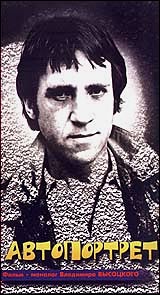 Vladimir
Vysotsky Vladimir
Vysotsky
Vladimir Vysotsky (1938-1980) was Russian actor,
lyricist, and folksinger whose social and political satire spoke
of the ironies and hardships of a strictly regulated Soviet
society. He was a phenomenon which at first seemed normal, for
his lyrics were pure and true and recognizably original, but
only in a matter of a few years his name grew to mythic proportions
in Russia's culture.While risking official displeasure, he became
an immensely popular figure who was revered by the Russian people
even after his death.
Vladimir Vysotsky was born in 1938 in Moscow. His father
was a soldier in the World War ll, and his mother was a translator
of German. His friends were his schoolmates and the punks who
ran around the city streets stealing cigarettes. They enjoyed
sneaking into movies, getting into fights, and other adventurous
things that normal kids in the cities did. In 1959 he began
working in the theater by the name of A. S. Pushkin as an actor
for small roles, and then in 1960 started performing in Soviet
films. But in 1964 he joined the Taganka Theater of Drama and
Comedy, directed by Yuri Lyubimov, where Vysotsky reigned supreme
as Hamlet, and many other roles.
From the early 60s he started performing his songs
among the company of friends. These songs, guitar-poems, where
regular poems to the beat of a guitar in the background. His
first songs were "street songs". They were what
are called in Russia "blatnye pesni", which means
songs about the streets, the drunks, drug addicts, pimps,
thieves, prostitutes, killers, spies, etc. These were what
he called a "street romance".
It wasn't long until Vysotsky's youthful interest in
drugs and street punks vanished and he began working on more
serious poetry. From 1964, his poems start to deal with the
World War II. Real, intense, sophisticated, and deeply philosophical
songs appear.
"Brothers Graves"
They don't put up crosses at the graves of brothers,
And widows don't come here to weep.
Somebody brings them a bouquet of flowers
And lights an Eternal flame.
Here the earth would stick out of
the ground,
And now - granite flagstones.
Here there is no personal fate -
All fates are mixed into one.
Within the flame - you see explosions
of tanks,
Russian homes burning.
A burning Smolensk and a burning Reichstag,
The burning heart of a soldier.
At the graves of the brothers there
are no widows in tears,
Stronger people go there.
They don't put up crosses at the graves of the brothers .
. .
But does this make things easier?
|
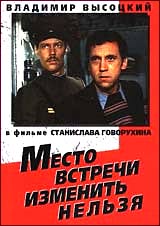 From
1964 he was a member of the Moscow Theatre of Drama and Comedy
on the Taganka. He was also featured in 26 motion pictures. From
1964 he was a member of the Moscow Theatre of Drama and Comedy
on the Taganka. He was also featured in 26 motion pictures.
The most famous movie "The place of meeting can't
be changed" was about the life of the Moscow Criminal
Investigations Department and about “thieves-in-law”,
luxurious restaurants and flea markets – about the life
after the Victory.
His great popularity as an actor was perhaps even exceeded
by his popularity as a poet and songwriter. He wrote his first
song in 1960 and would ultimately have a significant influence
on an entire genre of music.
|
He wrote several hundred
songs and poems, as well as incidental music for plays and films.
The main thing about Vysotsky was his style - his voice
was deep and gruff. His singing was intense that moved high
into a pitch that seemed all-powerful and grand. His words were
also direct and vivid - not soft and mellow like many bards',
but words of metal and fire.
His poetic lyrics have inspired two generations of Russians
and are working their way into the young hearts of a third.
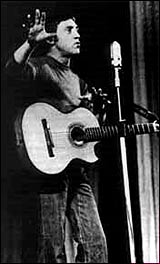 Soviet
officials permitted few of his songs to be sung on television
or in films or to be recorded. His lyrical fame spread from
appearances in clubs, factories, and universities and through
the mass distribution of homemade (and illegal) tape recordings
(magnitizdat) and publications (samizdat). He sang of such themes
as Soviet prison life ("Only the final judgment could be
worse"), Soviet official hypocrisy ("I grieve that
honour has been put to rout, that backbiting has been deified"),
and about ordinary Russian daily life (crowded living quarters,
long food lines, unfair privileges of the elite). Soviet
officials permitted few of his songs to be sung on television
or in films or to be recorded. His lyrical fame spread from
appearances in clubs, factories, and universities and through
the mass distribution of homemade (and illegal) tape recordings
(magnitizdat) and publications (samizdat). He sang of such themes
as Soviet prison life ("Only the final judgment could be
worse"), Soviet official hypocrisy ("I grieve that
honour has been put to rout, that backbiting has been deified"),
and about ordinary Russian daily life (crowded living quarters,
long food lines, unfair privileges of the elite).
"I sang everywhere. I performed
in people's homes, at night, with vodka or without, I sang in
airfield - at the same time as combat aircrafts were landing
- among black-dressed beatle-like technicians, we just went
away so that the words would be heard. I perfomed in buses,
in gigantic stadiums, and in the smallest places. In other countires
- and the French didn't understand: why is he so nervous and
why is he yelling so much? Even after I translated the songs
for them, they were still in a quandry, because for them singing
is a genre that shouldn't touch on any problematic topics."
If Vysotsky's songs were just protests, they would only
be good at the dissident rallies. Yet from his songs people
draw strength to live, to work, to love; the bard's poems touch
millions of hearts all over the world.
|
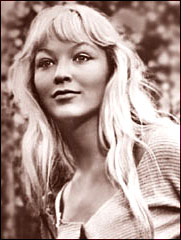 In
1975 he married the famous French actress of Russian descent
Marina Vlady (born Marina De Poliakoff-Baidaroff), and this
had a tremendous affect on the rest of his career. Being married
to a foreign woman, especially a major international celebrity,
he had the opportunity to leave the Soviet Union many times,
he even had the opportunity to emigrate. From 1975 to the year
of his death, 1980, he had performed all over Europe and America
- with major concerts in Paris, London, Berlin, New York, L.A.,
and Chicago. In
1975 he married the famous French actress of Russian descent
Marina Vlady (born Marina De Poliakoff-Baidaroff), and this
had a tremendous affect on the rest of his career. Being married
to a foreign woman, especially a major international celebrity,
he had the opportunity to leave the Soviet Union many times,
he even had the opportunity to emigrate. From 1975 to the year
of his death, 1980, he had performed all over Europe and America
- with major concerts in Paris, London, Berlin, New York, L.A.,
and Chicago.
Their love was legendary. Marina saved him many times.
Without her he would have died even earlier. He wrote songs
about her.
|
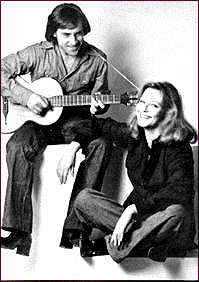 After
his tragic death from an overdose in 1980 Marina Vlady published
the memoir of her life with Vysotsky, entitled "Volodya:
Or A Flight Cut Short." In it she remembers
a truly sensitive scene when they were both in Berlin. After
his tragic death from an overdose in 1980 Marina Vlady published
the memoir of her life with Vysotsky, entitled "Volodya:
Or A Flight Cut Short." In it she remembers
a truly sensitive scene when they were both in Berlin.
Walking along the clean streets Vysotsky was fascinated
by the cleanliness, the wonderful cars parked along the streets
- Porsches, Mercedes', etc. - he noticed the stores filled with
all the kinds of foods, stores filled with wonderful clothes
and products - Marina noticed that Vysotsky felt ill and so
they went back to the hotel room.
|
When they came in Vysotsky
fell down on the bed in tears, shaking. "What's
wrong! What's wrong!" Marina asked. "It's
not fair! It's not fair!" He yelled, "They
lost! And we won! They did such horrors to us, and we are starving
like animals in our own country! It's not fair!" Such
was the affect of the West on the most famous man in the Soviet
Union.
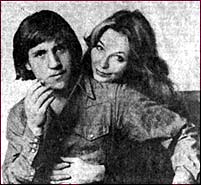 Back
in the USSR his concerts attracted thousands of people, stadiums,
concert halls, open fields, factories, hospitals - he was earning
the kind of cash that only Brezhnev earned. His popularity became
phenomenal, he could not go a single day without at least 40
people begging him for his autograph. At the same time he was
hassled by the KGB, jealous friends, and people who wanted something
from him. Back
in the USSR his concerts attracted thousands of people, stadiums,
concert halls, open fields, factories, hospitals - he was earning
the kind of cash that only Brezhnev earned. His popularity became
phenomenal, he could not go a single day without at least 40
people begging him for his autograph. At the same time he was
hassled by the KGB, jealous friends, and people who wanted something
from him.
|
He became the ultimate superstar of Soviet history -
in the eyes of the public from the late 1960s to the end of
his life in 1980 he was greater then Stalin.
He symbolized the soul of the nation - angry, repressed, tortured,
tired, and wild. His gaze was stern and fixed, his gruff voice
was the reflection of years of drinking and smoking, and screaming
and crying and singing. His voice was a symbol of repression
and angst, sinking deep into the poles of insanity and destroying
the borders of normality and conformity - out of this madness
appeared a dashing music of resistance and life, awareness and
victory. A voice that sent soldiers to tears, and the heartbeat
of the Soviet Union seemed to choke itself through his voice.
This was his greatest accomplishment - what he did for the culture
of the Soviet Union.
|
Vysotsky would
probably be the definitive example of counter-culture in the
Soviet Union - in each possible way. His interests were wide
and varied, he collected large amounts of records from the West:
jazz, rock, blues. In his three-bedroom apartment in Moscow
there was a large library, filled with books on literature and
the war.
Vysotsky knew he was going to die soon - everyone knew
he was going to die soon, or at least those who watched him
die. It wasn't the drugs - it was the repression. It was the
knowledge that his poetry was not published - and there was
no conceivable way that it could be published in his lifetime
- and that is perhaps the poets greatest sadness - that his
art can only go around illegally underground.
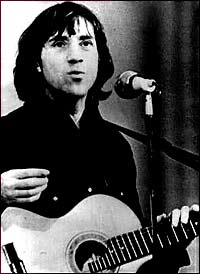 He
died on July 25 1980 in his sleep, during the Olympics in
Moscow. He
died on July 25 1980 in his sleep, during the Olympics in
Moscow.
It has always been remembered as the hottest day in
the year, stadiums were packed with the Olympics taking place.
Then suddenly people began to notice that policemen would
take off their caps after speaking into their radios. "What's
the problem?" everybody would ask. "Vysotsky's
dead!" It was a strange site - thousands of
Russians left the stadiums, their workplaces, their homes,
and schools and went in a massive procession to the Taganka
theater where Vysotsky performed Hamlet - gathering on the
roofs of buildings, staring out of windows, people began crying
and singing Vysotsky's songs.
Vysotsky's funeral was a funeral of an era. The time of
Okudzhava and Vysotsky was over - one of the greats had left.
Among the thousands of people who showed up to mourn
the death of a living god, Bulat Okudzhava delivered a small
speech:
"He is a true poet, and his
bright and wide name is the greatest weapon against lies,
horror, and what is called 'mass culture.'..."
Fellow actor from the Taganka, Yuri Trifonov, also
gave a small speech: "He brought
a strength, a love for life, and a deep meaning to the music
of our 60s and 70s. He sang so much sadness about our time
and about us, he blessed us - those who with love collected
his recordings, who sang with him his songs, who heard them
by accident from windows wide open - he blessed us with poetry,
sadness and masculinity, the kind that is needed in life.
He was the poet of legendary temperament, and he left . .
."
Among the others that wrote great essays and speeches
on Vysotsky was Yuri Vizbor. "Vladimir
Vysotsky was a loner. A bigger loner than many would believe
. . . . . all his life he battled with officials and bureaucrats,
to whom Vysotsky's work was never really considered as work.
With those who saw what they wanted to see in Vysotsky - the
vulgar, the drunk, the hysteric, the seeker of cheap popularity,
the god of drunks and punks. . . . . there were no limits
to his songs - thank God that there are tape recorders for
sale in stores. He screamed his poetry, and this tape recorder
scream hung over the whole nation - 'from Moscow to the very
outskirts.' For his strength, for his truth - all was forgiven.
His songs were the nations songs, and he himself was an artist
of the nation."
Gorodnitsky wrote a song, tribute to Vysotsky:
At Vagankov dried leafs are burning.
The sun reflects in domes - it burns the eyes.
Come over here and quietly start praying -
Even if this is your first time.
|
|
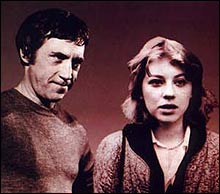 He
died at 42 of a heart attack, brought on, it was said, by
his well-known carousing, hard-drinking life-style. He
died at 42 of a heart attack, brought on, it was said, by
his well-known carousing, hard-drinking life-style.
Vysotsky's departure was a shock to the nation. But
it made people more aware of the importance of the musicians
and their contribution to Russian culture.
Until his death, Vladimir Vysotsky, "A
voice of a silent nation" was a prophet without
honor in his own country.
Although he wrote more than a thousand highly popular
songs, he died without an official record release to his name.
The reason for this studied neglect lay in the political tenor
of his material. Vysotsky, who began performing in the 1960s,
was quite critical of the Communist regime, and his lyrics
took position on the Soviet status quo. His songs derived
from the blatny pesny (literally, delinquent songs) tradition,
with its celebration of sex, drink, and street fights. Informally
distributed cassettes ensured Vysotsky a wide and enthusiastic
following.
After his death, in 1980, Gorbachev
granted his music an amnesty and a 20-album retrospective
was released. In the late 1980s the Soviet government began
allowing the publication of his poetry and song lyrics.

|
|
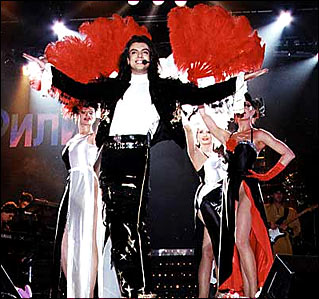
Philip Kirkorov, May 1998, show
in Las Vegas. |

|
|
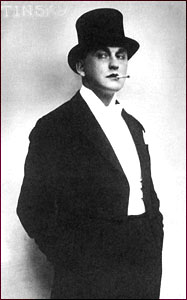 Alexander
Vertinsky Alexander
Vertinsky
In the distant, pre-revolutionary Russia of 1917, in
Moscow's more intimate theatres, with only 300 seats, there
appeared a tall, lean youth, dressed in the costume of Pierrot.
A white mask of the face set off the dramatic blackened brow
and scarlet mouth. Up flew his unusually expressive hands
with elongated fingers, and he began to sing...
His miniature novellas-in-song were known as ariettes.
Either because their themes hit the mark, or simply owing
to the young man's rapport with the public, these songs began
to circulate, their lyrics transmitted by word of mouth. The
novice performer was christened the "Russian Pierrot",
gained renown, became an object of imitation, admiration,
simultaneously vilified in the press and lionized by the audiences;
his career was destined to be brilliant. The young celebrity
was Alexander Vertinsky (1889-1957), a poet, singer, actor
and composer.
Not quite aware of that, Vertinsky was creating a new
variety show form, in which poet, composer, singer and actor
united in one person. Today we know that Vertinsky brought
a new subject to the stage, similar to the one presented on
screen, almost at the same time but in a different way, by
the great Charlie Chaplin.
"We were hungry, we wore broken
shoes and slept sitting at the tables of night pubs, but we
never gave up! We forced our way into literature, into life!
The time was hot, horrible, dark, but we were moving grippingly
toward the light." - These were the words
in which Alexander Vertinsky recalled his young days.
The tidal waves of the October
1917 revolution swept away the finest offspring of Russian
culture. Poet Ivan Bunin, bass Feodor Shalyapin, silent screen
idol Ivan Moszhukhin, ballerina Anna Pavlova, Alexander Vertinsky
- the artistic elite fostered during Russia's "Silver
Age" and forced to leave their native land - were doomed
to long years of spiritual exile. Unable to accept the
revolution, Vertinsky chose emigration, leaving Russia
and eventually setting in Europe. This marks the beginning
of Russian Pierrot's thorny road. His upraised thin hands
now implore not for private joys, but the salvation of a nation.
His new muse is the nostalgia of regret. His little dities
grew into concise epics inhabited by circis clowns and cocain
addicts, cabaret dancers and movies stars, capricious, richly
caped femmes fatales and lowly vagrants, bohemians and gigolos,
page boys and peers. They all fall in love, suffer, dream
of happiness, pine with regret, huri themselves headlong after
life's fleeting pieasures and bemoan its bitter disappointments.
He now appeared to the public in coattails, crisp
white shirtfront and patent leather shoes. Vertinsky's artistry
approached virtuosity, he was called "Shalyapin of the
vaudeville stage" and "the Russian bard". His
name encapsulates a genre all his own. He is the embodiment
of an entire era in Russian history! His voice casts a spell,
his songs invoke mysterious, faraway lands. Once experienced,
he is permanently etched in memory. He is the toast of Paris,
London, New York. His audiences include Russian eminres, Frenchmen
and Englishmen. Among his fans he counts choreographer Michel
Fokin, impressario Sergey Diaghelev, Feodor Shalyapin... For
a second time, Vertinsky is riding on a wave of popularity.
Paradoxically, at the height of his success, Vertinsky
is assiduously petitioning the Soviet goverment:"...
let me come back, please! My heart yearns for Russia, my home,
which has been such hardships, atrocities, famine and privations".
Only in late 1943 he was granted a permission to return.
The war raged on, the nation just barely beginning to recover
from the grueling years of pointless slaughter. He returned
home with a new repertoire, with a note of tragedy added to
his predominantly nostalgic songs. His songs reflected the
mood of many outstanding Russian people Vertinsky had met
in emigration, people scattered around the world by the revolution.
Here, in his devastated native land, Vertinsky gave many charity
performances to benefit famine victims, wounded soldiers,
orphaned children. He was heard throughout the whole country:
in Siberia, the Soviet Far East and Central Asia, touring
inordinately while he sang himself hoarse, as if believing
that his songs would thaw people's hearts. To him this nation
was not "Soviet Union";
quite the opposite, it was still "his
old Russia", his birthplace and source of
comfort. This is where he sang away his remaining years. Fame,
which came to him twice before, made a third and final appearance.
Russian art, to whose fold he returned a fully formed master,
embraced him like any true parent, unquestioningly, despite
his years of wandering.
He toured the country with concerts and everywhere
he enjoyed success and the recognition of the public. But
the mass media kept complete silence, not producing a single
review or comment. The authorities wanted him to understand
that back home he remained a stranger because he refused to
fit his art into the canons of Soviet art. Vertinsky seems
to have started the sad list of artists admired by the public
and rejected by the officials. The list was closed by
Vladimir Vysotsky, a poet and singer of his verses from another
generation.
The name of Alexander Vertinsky is legendary. His
songs never did acquire the infection of revolutionary rhetoric
- he remained a liberated child of his great culture. The
fact that he survived Stalin's purges imparted a mythical
reputation to his later years in the USSR. Perhaps the explanation
was that even a despot's heart has a secret compartment to
which the poet holds the key. Vertinsky's poetry, music and
singing from the summit of Imperial Russia's period of artistic
decline; he is the final ray, gleaning in the twilight of
Russian Silver Age.
"Yes, my art was the reflection of my epoch,"
Vertinsky wrote in his memoirs. "I
was its microphone. By some inner feeling I could guess the
most important, something at the back of most people's minds:
their private thoughts, wishes, and beliefs. Often I did it
well in advance."
Alexander Vertinsky died in 1957, but the magic of
his art continues to live in people's hearts.
|

|
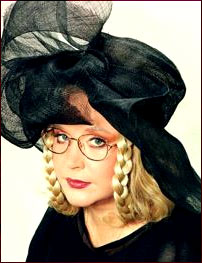 Alla
Pugacheva Alla
Pugacheva
Alla Pugacheva (born in 1949 in Moscow) is the embodiment
of success in the true Russian style. That is, success against
all odds. And in that sense, Alla Pugacheva is the true Russian
national legend in the full meaning of the word.
She is a Number One Superstar in Russia during last twenty
years. Her voice is magic and her life is a good story for a
book.
|
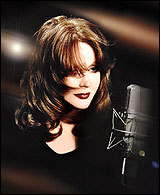 Her
biography is years of studying (the Ippolitov-Ivanov school
of Music, the Lunacharsky School of Theatrical Arts), years
of searching (her first recordings on the radio, made when she
was only 16, her first trips with the promotions crew of the
radio station "Youth" in Siberia and Far East, working
with the bands "New Electron", "Moscovites",
"Happy Fellows", and Oleg Lundstrem's ensemble). Her
biography is years of studying (the Ippolitov-Ivanov school
of Music, the Lunacharsky School of Theatrical Arts), years
of searching (her first recordings on the radio, made when she
was only 16, her first trips with the promotions crew of the
radio station "Youth" in Siberia and Far East, working
with the bands "New Electron", "Moscovites",
"Happy Fellows", and Oleg Lundstrem's ensemble).
|
 Her
first spark of success came upon receiving of the third place
prize at the All Union competition of pop artists in 1974 with
songs like "Posidim Pookaem" and "Ermolova from
Clear Ponds" Her
first spark of success came upon receiving of the third place
prize at the All Union competition of pop artists in 1974 with
songs like "Posidim Pookaem" and "Ermolova from
Clear Ponds"
The first Star (and not the heroine of Socialist work)
with all the resulting God-like qualities of that status in
then the Soviet Union. She achieved everything with hard work
and struggle with all her flaws, which gradually ceased to be
so to her millions of fans.
It was the victory at Varnes in 1975 with the song "Arlekino"
that gave us the great singer and actress, which we so love.
The victory at Sopot on the International Contest with the song
"Kings Can Do Everything" in 1978 once again proved
her status quo.
In the twenty years that followed that event Alla Pugacheva
has reached everything one could wish for in Russia and the
former Soviet Union.
|
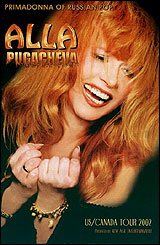 She
is the last Peoples Honor Singer of the Soviet Union, the laureate
of many domestic and foreign awards, as well as Russia's number
one newsmaker, and the participant of many prestigious musical
festivals all over the world (which she has toured many times). She
is the last Peoples Honor Singer of the Soviet Union, the laureate
of many domestic and foreign awards, as well as Russia's number
one newsmaker, and the participant of many prestigious musical
festivals all over the world (which she has toured many times).
She has done so much since that it is amazing she could
have so much energy. Her album sales amount to about 300 million
copies, and the movies in which she played, have had enormous
success in the box office. Her concert programs, such as "The
Monologues of a Singer" (1981) and "I Came and I'm
Talking"(1984) are to this day yet to be outdone. Her "Christmas
Reunions" (1988-1992) have, for five years in a row, gathered
15 thousand viewers.
Her name has been given to an ocean liner in Finland,
a brand of French perfume, a magazine (whose editor in chief
is Alla herslef) and a line of shoes (also designed by Allla).
Her daugter, Kristina Orbakaite, is now a popular cinema
and theatre actress and a singer. Her lastest husband, Philipp
Kirkorov, is also a popular singer.
 Few popular songs (require shockwave
player)
Few popular songs (require shockwave
player) |

|
Links
soviet
screen, Interview
with A. Vertinsky, Vertinsky's
poems, his
poems in English, about
Vladimir Visotsky, Vysotsky's
poems, list
of articles about Vysotsky,(in Russian), Vladimir Vysotsky
official
site, article
about Vysotsky, Vysotsky's
songs (Eng/Rus), Russian rock group Aquarium official
site, about
Philip Kirkorov, Christina
Orbakaite official site (in English), about
Vysotsky (in German) |
|



